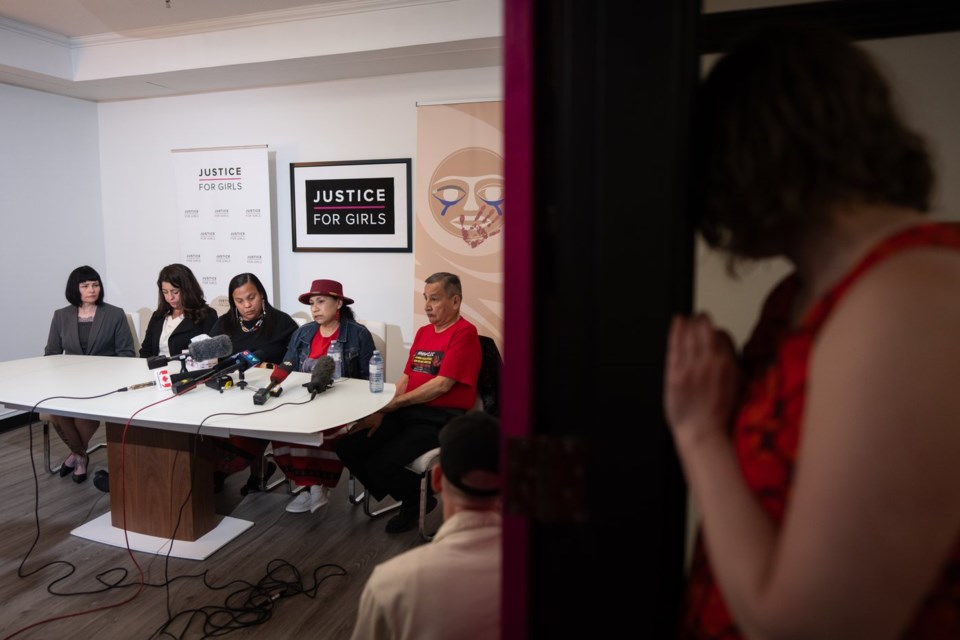VANCOUVER — Tatyanna Harrison was someone who always fought for justice, but she hasn't been given the same treatment by investigators upon her death, her mother said through tears on Monday.
Now Natasha Harrison, along with family members of two other Indigenous females and a B.C. advocacy group say they want more answers and a coroner's inquest into the deaths of their loved ones three years ago.
"I miss my baby girl," Natasha Harrison said. "I remember going into stores, and I couldn't pass someone in need without her making me help them, even if I was broke."
"She just wanted fairness and justice. And the irony is she's being failed in that very way," she said.
All three Indigenous females were found dead in Metro Vancouver, and the families say a lack of answers from investigating authorities prompted the demand for the coroner's inquest.
Justice for Girls lawyer Sue Brown said during a news conference Monday that they need to know more about the deaths of Harrison, 20, Chelsea Poorman, 24, and 13-year-old Noelle O'Soup.
Brown said the group sent a letter to Public Safety Minister Garry Begg, asking for the inquest.
"All three of these cases from the very beginning were the subject of massive failures by all of the investigative authorities involved," Brown said. "When it comes to the quality of police investigations, those flow directly from the findings of the coroner and the quality the coroner's investigation."
Harrison's body was found in Richmond, while Poorman's body was discovered behind an abandoned home in Vancouver and the body of O'Soup was found in the apartment of a sex offender after he died in the Downtown Eastside.
Justice for Girls said Harrison was found partially clothed in an abandoned yacht in dry dock, and investigators initially said her death was likely due to an overdose, before a coroner later concluded she died of sepsis.
The group, with the permission of family members, obtained a review by an independent forensic pathologist, Brown said, which found the cause of death should have been ruled as "undetermined."
She said police have based their findings on the coroner's conclusion and haven't furthered the investigation.
"The pathologist disagrees with their findings on her cause of death and concluded that there is no compelling evidence that Tatiana died of sepsis," Brown said.
"Initially, the coroner told the family that her death was due to fentanyl overdose in 2022, with no explanation as to why her cause of death changed to sepsis six months later.
No rape kit had been done during her autopsy, despite the fact that Tatyanna was found partially naked on a dry-docked yacht with no explanation of how she got there, with whom she was with, or why she was there, Brown said.
The group's request comes on Red Dress Day, the national day of awareness for missing and murdered Indigenous women, girls and those in the LGBTQ+ community.
In a statement, Begg said he has received the inquest request and his office is "looking into" the matter.
“Families expect that everyone involved in investigations like these works hard to get justice for those who died too soon," Begg said. "It’s crucial that we can trust the integrity and actions of the officers doing these heartbreaking investigations."
A statement from the province earlier Monday on Red Dress Day said the government is committed "to being a voice in government that will continue to advocate for an end to gender-based violence and harm against Indigenous people."
"Indigenous women and girls are more likely to be murdered, assaulted or go missing than any other women in the country," the statement said. "It's crucial that we persist in addressing the underlying issues of violence, such as colonialism, racism and misogyny."
Grand Chief Stewart Phillip, president of the Union of B.C. Indian Chiefs, said during the news conference that the police investigations into the three deaths are in contrast to the 2009 death of jogger Wendy Ladner-Beaudry at Pacific Spirit Regional Park in Vancouver.
"She was white," Phillip said. "There was a task force established. There was a $30,000 reward set up for information leading to the conclusion of that investigation. But you haven't heard of a similar response to these three cases here.
"You never do. They're dismissed. They are not fully investigated. And quite frankly, that has to change."
Phillip said Indigenous groups may consider taking legal action against governments and policing agencies "to move (them) to provide sufficient resources to follow these cases through."
"We hear about accelerated resource development projects," he said. "We hear tariffs, but we don't hear about missing and murdered Indigenous women and girls," he said.
"In most cases, any concerns that we bring forward are completely dismissed."
This report by The Canadian Press was first published May 5, 2025.
Chuck Chiang, The Canadian Press



